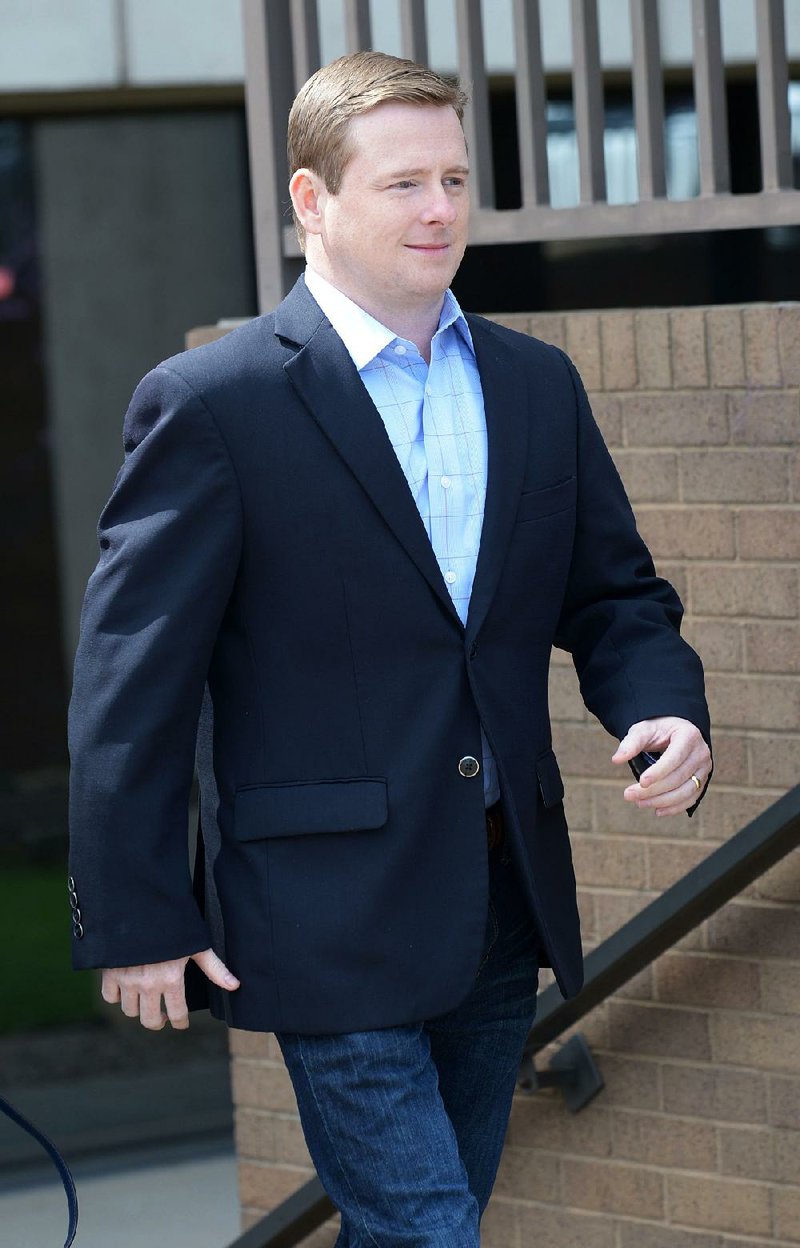FAYETTEVILLE — Randell Shelton Jr. lived rent-free in the basement apartment of a friend’s parents while his consulting business received $115,000 in payments from Ecclesia College, according to testimony today.
Shelton is on trial for allegedly passing along kickbacks from the college in return for $550,000 in state grants directed to Ecclesia by two legislators. Assistant U.S. Attorney Kennth Elser described Shelton’s company, Paradigm Strategic Consulting, in opening statements April 10 as a “bogus” company created to pass along the kickbacks.
Shelton’s defense closed its case this morning. He didn’t take the stand in his defense. The prosecution has two rebuttal witnesses it plans to call to the stand today. The judge will then send the jury home.
Closing arguments will take place Tuesday.
Dr. George Schroeder, a Little Rock ophthalmologist and co-owner of a weight loss clinic there, testified this morning on Shelton’s behalf. He allowed Shelton to move into a basement apartment at his home near Bigelow in the late autumn of 2013, Schroeder said. Shelton is a friend of his son, Daniel, and needed a place to live, Schroeder testified. The doctor also employed Shelton to do marketing for the weight loss clinic, New Creations MedSpa.
Shelton’s consulting company received a $50,000 check from Ecclesia on Sept. 27, 2013, Assistant U.S. Attorney Aaron Jennen reminded the jury in cross-examination.
“Do you think someone who had just been paid $50,000 ought to be able to find a place to live?” Jennen asked Schroeder. Schroeder replied “Yes.” Jennen went on to show another $65,000 in checks issued to Paradigm from Ecclesia before Shelton moved out of the basement apartment in early June 2014.
But would showing checks a business received without showing expenses and other records give a clear picture of his income from either his ophthalmology clinic or the weight loss business, asked Shelton defense attorney Chad Atwell. No it would not, Schroeder replied.
His client’s defense is based on the contention the government’s investigation was inadequate, Atwell told the judge Friday during a conference away from the jury.
Shelton’s defense called character witnesses today such as his pastor, Robert Parry, and a long-time friend and former business associate, David Glosup, both from his hometown community of Mabank, Texas. Each attested to Shelton’s honesty and business acumen.
Shelton is on trial along with former state Sen. Jon Woods, R-Springdale. The two were was indicted in March 2017, accused of a kickback scheme involving state General Improvement Fund grants issued in 2013 and 2014. An alleged co-conspirator, Oren Paris III, former president of Ecclesia College in Springdale, was indicted with Woods.
Paris pleaded guilty April 4 to one count of conspiracy.
Paris resigned as Ecclesia’s president and from the private, Christian college’s board before his plea. His sentence is pending. Paris disguised the kickbacks as consulting fees paid to Paradigm Strategic Consulting, according to the indictment. Shelton then passed the money along to Woods and former state Rep. Micah Neal of Springdale, the government contends.
The kickback allegations involve $550,000 of the more than $717,500 in Improvement Fund grants, the U.S. Department of Justice contends. Woods directed the most grant money Ecclesia received at more than $350,000, court records show.
Neal pleaded guilty Jan. 4, 2017, for his role in the scheme and was the government’s first witness in the case. His sentence is also pending.
The trial of Woods and Shelton began April 9 in federal court in Fayetteville and is expected to end this week.
Woods directed a $200,000 grant to Ecclesia in September 2013, grant records show. Neal supported a $50,000 grant to the college and Woods another $150,000 in December 2014, also according to grant records. The amount of money Woods is accused of receiving as a kickback isn’t specified in the indictment. It claims much of that money was paid in cash, except for the $40,000 wire transfer from Shelton.
That Oct. 1, 2013, wire transfer was a loan, Shelton’s defense contends.
Woods faces 15 counts of fraud, all relating to either wire or mail transfers of money. Paris and Shelton were named in 14 of the fraud charges. All three were charged with one count of conspiracy to commit fraud. Woods is also charged with one count of money laundering in connection with the purchase of a cashier’s check.
Woods and Shelton face up to 20 years in prison on the fraud and conspiracy charges, if convicted. Woods faces an additional 10 years on the money-laundering charge, if convicted.
Woods and Neal also directed $400,000 in grant money to AmeriWorks, court and state records show. Neal said he received $20,000 delivered by Woods for steering $125,000 to AmeriWorks. Grant records show Woods directed $275,000 to the company.
AmeriWorks was incorporated by lobbyist Russell “Rusty” Cranford and described in a grant application as a work-training program. Cranford, 56, is set for trial June 11 in federal court in Springfield, Mo., on one count of conspiracy and eight counts of accepting bribes in an unrelated indictment.


